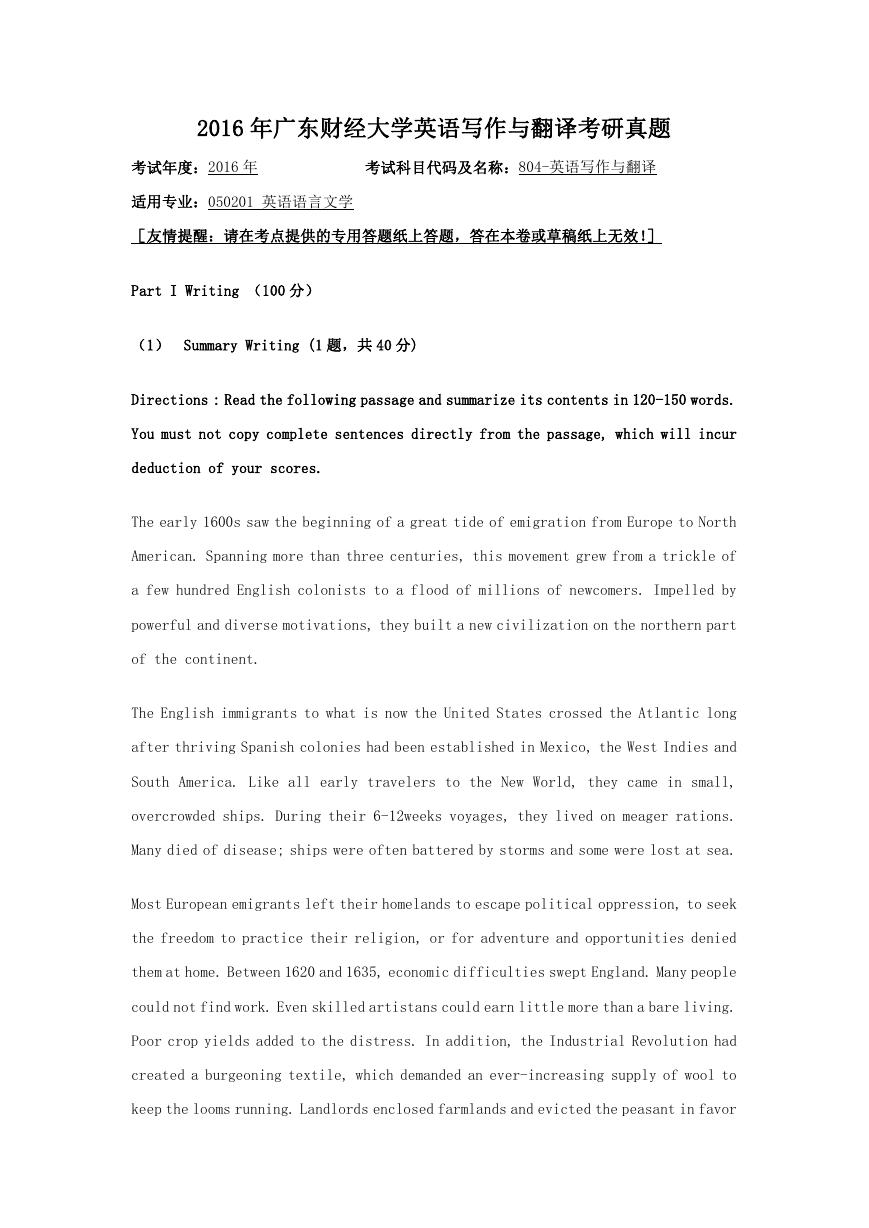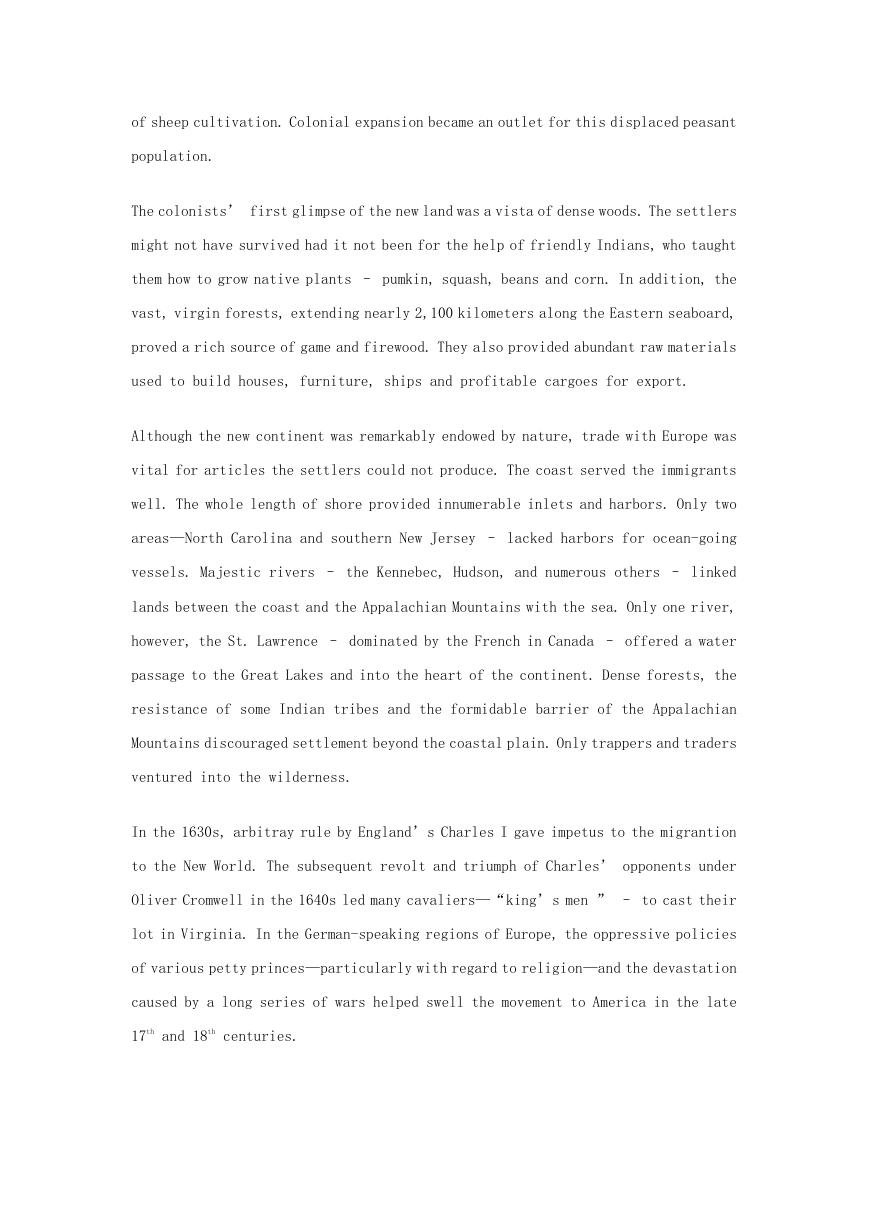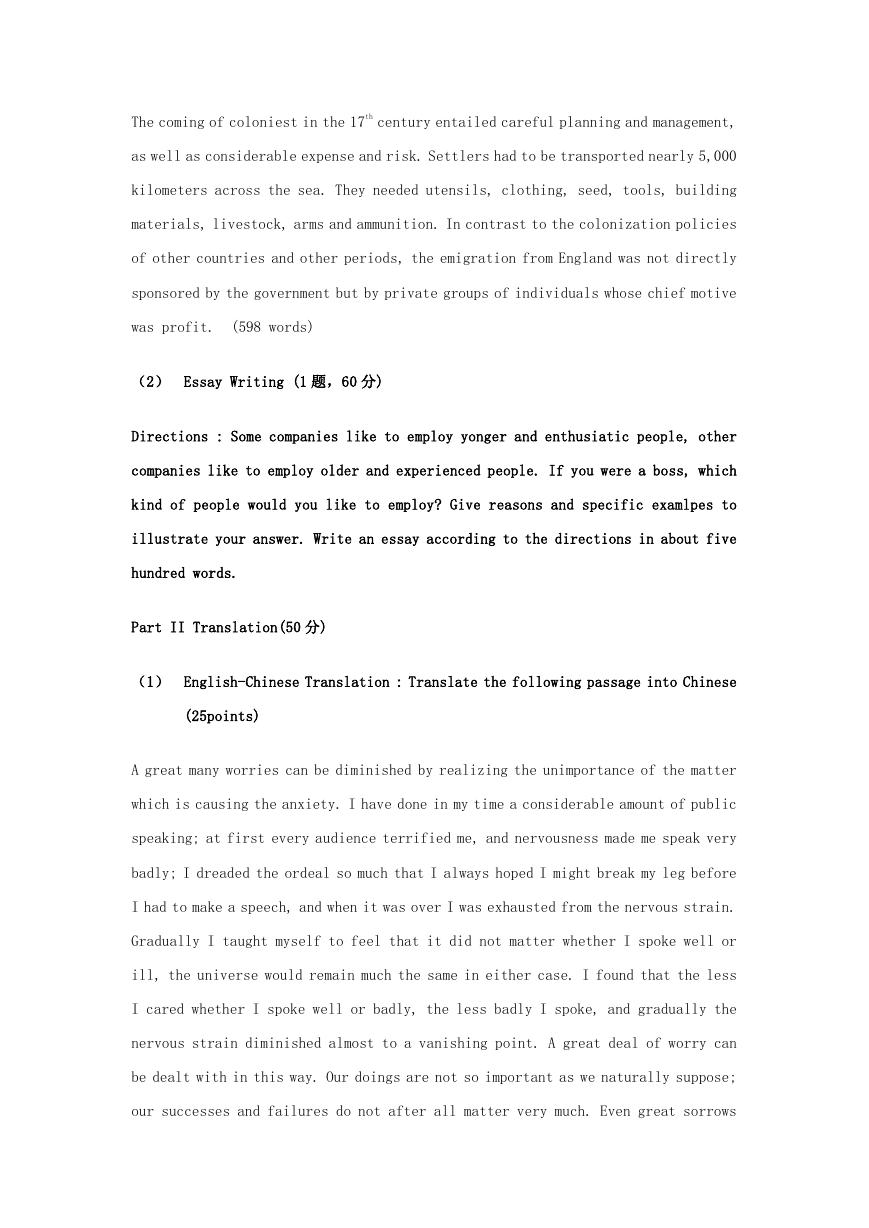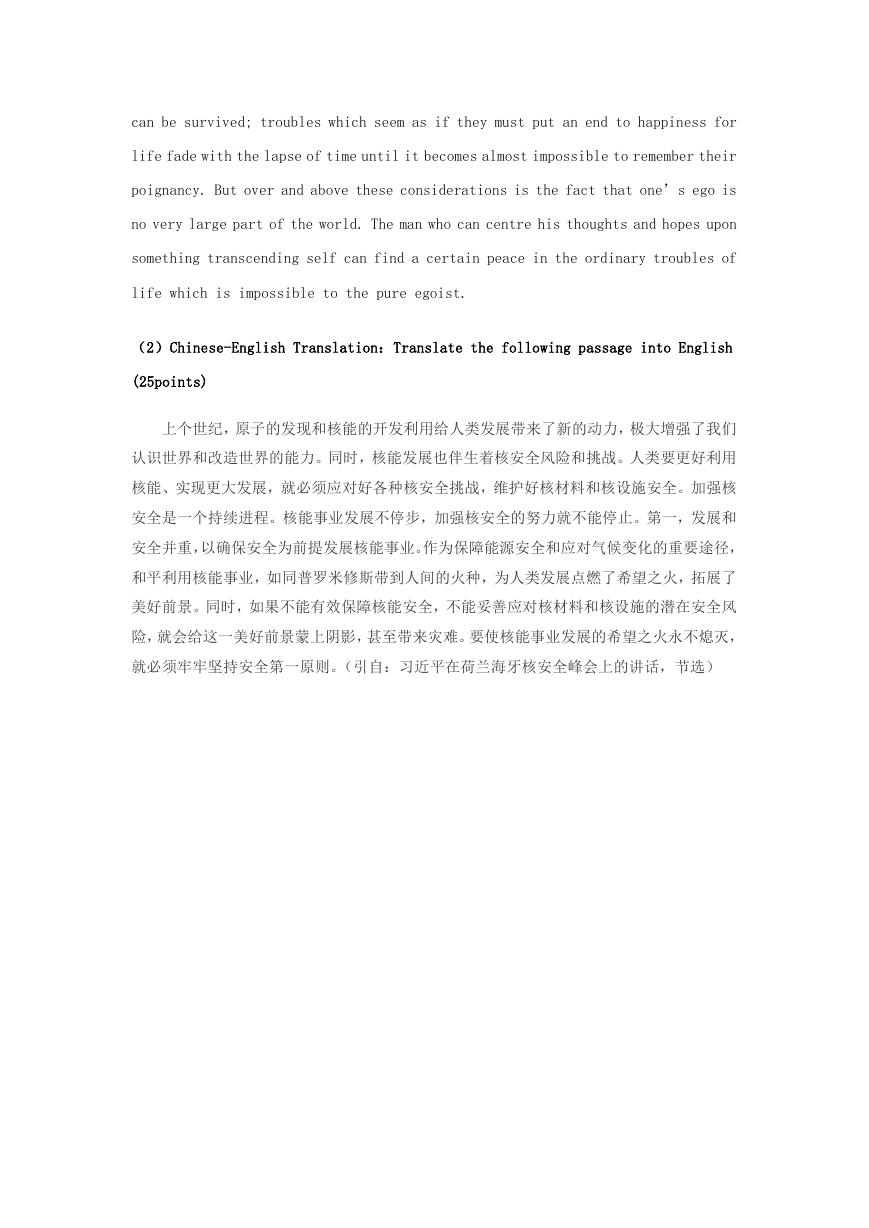2016 年广东财经大学英语写作与翻译考研真题
考试年度:2016 年
考试科目代码及名称:804-英语写作与翻译
适用专业:050201 英语语言文学
[友情提醒:请在考点提供的专用答题纸上答题,答在本卷或草稿纸上无效!]
Part I Writing (100 分)
(1) Summary Writing (1 题,共 40 分)
Directions : Read the following passage and summarize its contents in 120-150 words.
You must not copy complete sentences directly from the passage, which will incur
deduction of your scores.
The early 1600s saw the beginning of a great tide of emigration from Europe to North
American. Spanning more than three centuries, this movement grew from a trickle of
a few hundred English colonists to a flood of millions of newcomers. Impelled by
powerful and diverse motivations, they built a new civilization on the northern part
of the continent.
The English immigrants to what is now the United States crossed the Atlantic long
after thriving Spanish colonies had been established in Mexico, the West Indies and
South America. Like all early travelers to the New World, they came in small,
overcrowded ships. During their 6-12weeks voyages, they lived on meager rations.
Many died of disease; ships were often battered by storms and some were lost at sea.
Most European emigrants left their homelands to escape political oppression, to seek
the freedom to practice their religion, or for adventure and opportunities denied
them at home. Between 1620 and 1635, economic difficulties swept England. Many people
could not find work. Even skilled artistans could earn little more than a bare living.
Poor crop yields added to the distress. In addition, the Industrial Revolution had
created a burgeoning textile, which demanded an ever-increasing supply of wool to
keep the looms running. Landlords enclosed farmlands and evicted the peasant in favor
�
of sheep cultivation. Colonial expansion became an outlet for this displaced peasant
population.
The colonists’ first glimpse of the new land was a vista of dense woods. The settlers
might not have survived had it not been for the help of friendly Indians, who taught
them how to grow native plants – pumkin, squash, beans and corn. In addition, the
vast, virgin forests, extending nearly 2,100 kilometers along the Eastern seaboard,
proved a rich source of game and firewood. They also provided abundant raw materials
used to build houses, furniture, ships and profitable cargoes for export.
Although the new continent was remarkably endowed by nature, trade with Europe was
vital for articles the settlers could not produce. The coast served the immigrants
well. The whole length of shore provided innumerable inlets and harbors. Only two
areas—North Carolina and southern New Jersey – lacked harbors for ocean-going
vessels. Majestic rivers – the Kennebec, Hudson, and numerous others – linked
lands between the coast and the Appalachian Mountains with the sea. Only one river,
however, the St. Lawrence – dominated by the French in Canada – offered a water
passage to the Great Lakes and into the heart of the continent. Dense forests, the
resistance of some Indian tribes and the formidable barrier of the Appalachian
Mountains discouraged settlement beyond the coastal plain. Only trappers and traders
ventured into the wilderness.
In the 1630s, arbitray rule by England’s Charles I gave impetus to the migrantion
to the New World. The subsequent revolt and triumph of Charles’ opponents under
Oliver Cromwell in the 1640s led many cavaliers—“king’s men ” – to cast their
lot in Virginia. In the German-speaking regions of Europe, the oppressive policies
of various petty princes—particularly with regard to religion—and the devastation
caused by a long series of wars helped swell the movement to America in the late
17th and 18th centuries.
�
The coming of coloniest in the 17th century entailed careful planning and management,
as well as considerable expense and risk. Settlers had to be transported nearly 5,000
kilometers across the sea. They needed utensils, clothing, seed, tools, building
materials, livestock, arms and ammunition. In contrast to the colonization policies
of other countries and other periods, the emigration from England was not directly
sponsored by the government but by private groups of individuals whose chief motive
was profit.
(598 words)
(2) Essay Writing (1 题,60 分)
Directions : Some companies like to employ yonger and enthusiatic people, other
companies like to employ older and experienced people. If you were a boss, which
kind of people would you like to employ? Give reasons and specific examlpes to
illustrate your answer. Write an essay according to the directions in about five
hundred words.
Part II Translation(50 分)
(1) English-Chinese Translation : Translate the following passage into Chinese
(25points)
A great many worries can be diminished by realizing the unimportance of the matter
which is causing the anxiety. I have done in my time a considerable amount of public
speaking; at first every audience terrified me, and nervousness made me speak very
badly; I dreaded the ordeal so much that I always hoped I might break my leg before
I had to make a speech, and when it was over I was exhausted from the nervous strain.
Gradually I taught myself to feel that it did not matter whether I spoke well or
ill, the universe would remain much the same in either case. I found that the less
I cared whether I spoke well or badly, the less badly I spoke, and gradually the
nervous strain diminished almost to a vanishing point. A great deal of worry can
be dealt with in this way. Our doings are not so important as we naturally suppose;
our successes and failures do not after all matter very much. Even great sorrows
�
can be survived; troubles which seem as if they must put an end to happiness for
life fade with the lapse of time until it becomes almost impossible to remember their
poignancy. But over and above these considerations is the fact that one’s ego is
no very large part of the world. The man who can centre his thoughts and hopes upon
something transcending self can find a certain peace in the ordinary troubles of
life which is impossible to the pure egoist.
(2)Chinese-English Translation:Translate the following passage into English
(25points)
上个世纪,原子的发现和核能的开发利用给人类发展带来了新的动力,极大增强了我们
认识世界和改造世界的能力。同时,核能发展也伴生着核安全风险和挑战。人类要更好利用
核能、实现更大发展,就必须应对好各种核安全挑战,维护好核材料和核设施安全。加强核
安全是一个持续进程。核能事业发展不停步,加强核安全的努力就不能停止。第一,发展和
安全并重,以确保安全为前提发展核能事业。作为保障能源安全和应对气候变化的重要途径,
和平利用核能事业,如同普罗米修斯带到人间的火种,为人类发展点燃了希望之火,拓展了
美好前景。同时,如果不能有效保障核能安全,不能妥善应对核材料和核设施的潜在安全风
险,就会给这一美好前景蒙上阴影,甚至带来灾难。要使核能事业发展的希望之火永不熄灭,
就必须牢牢坚持安全第一原则。(引自:习近平在荷兰海牙核安全峰会上的讲话,节选)
�








 2023年江西萍乡中考道德与法治真题及答案.doc
2023年江西萍乡中考道德与法治真题及答案.doc 2012年重庆南川中考生物真题及答案.doc
2012年重庆南川中考生物真题及答案.doc 2013年江西师范大学地理学综合及文艺理论基础考研真题.doc
2013年江西师范大学地理学综合及文艺理论基础考研真题.doc 2020年四川甘孜小升初语文真题及答案I卷.doc
2020年四川甘孜小升初语文真题及答案I卷.doc 2020年注册岩土工程师专业基础考试真题及答案.doc
2020年注册岩土工程师专业基础考试真题及答案.doc 2023-2024学年福建省厦门市九年级上学期数学月考试题及答案.doc
2023-2024学年福建省厦门市九年级上学期数学月考试题及答案.doc 2021-2022学年辽宁省沈阳市大东区九年级上学期语文期末试题及答案.doc
2021-2022学年辽宁省沈阳市大东区九年级上学期语文期末试题及答案.doc 2022-2023学年北京东城区初三第一学期物理期末试卷及答案.doc
2022-2023学年北京东城区初三第一学期物理期末试卷及答案.doc 2018上半年江西教师资格初中地理学科知识与教学能力真题及答案.doc
2018上半年江西教师资格初中地理学科知识与教学能力真题及答案.doc 2012年河北国家公务员申论考试真题及答案-省级.doc
2012年河北国家公务员申论考试真题及答案-省级.doc 2020-2021学年江苏省扬州市江都区邵樊片九年级上学期数学第一次质量检测试题及答案.doc
2020-2021学年江苏省扬州市江都区邵樊片九年级上学期数学第一次质量检测试题及答案.doc 2022下半年黑龙江教师资格证中学综合素质真题及答案.doc
2022下半年黑龙江教师资格证中学综合素质真题及答案.doc